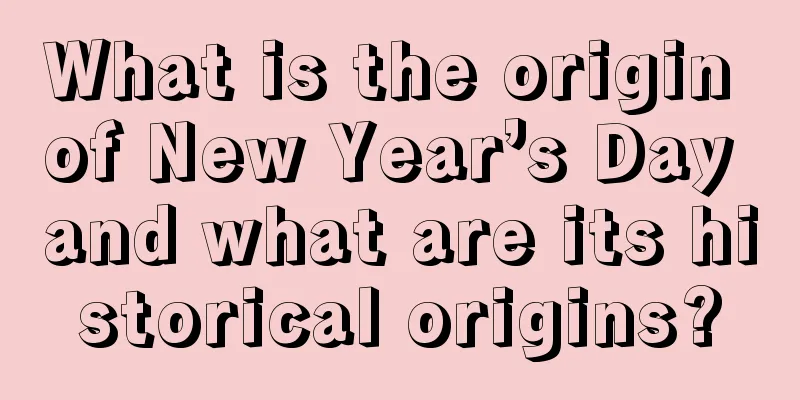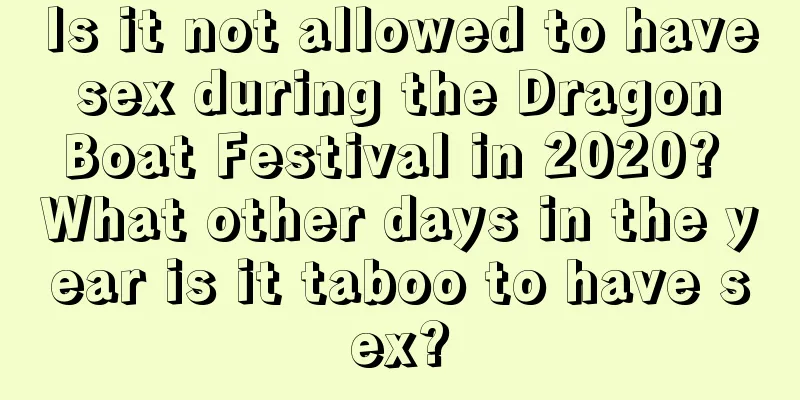What is the origin of New Year’s Day and what are its historical origins?

Every festival has its own origin and story. What is the origin of New Year’s Day and what is its historical origin? Some days are auspicious, while others are inauspicious. Predicting the auspiciousness and inauspiciousness of days in advance can help us avoid a lot of unnecessary troubles. Shuimoxiansheng.com has predicted the good and bad luck for each day of the twelfth lunar month of 2019. Come and pay attention.What is the origin of New Year’s Day?——Introduction to the origin of Chinese New Year:《1》Chinese New Year's Day originated from: The word "New Year's Day" first appeared in "Book of Jin": "Emperor Zhuanxu took the first month of summer as the beginning, but it was actually the New Year's Day of the lunar calendar." It was called "Yuanzheng" in "Inscription on Three Hairpins" by Cui Yuan of the Han Dynasty, "Yuanchen" in "Ode to Yangdu" by Yu Chan of the Jin Dynasty, "Yuanchun" in "Song of the Emperor's Summer at the Grand Festival" of the Northern Qi Dynasty, and "Yuanshuo" in the poem "Watching the Army Return to the Camp after Retiring from Court on New Year's Day" by Li Shi, Emperor Dezong of the Tang Dynasty. 《2》Development of the Northern and Southern Dynasties: During the Northern and Southern Dynasties, the Southern Dynasty historian Xiao Ziyun’s poem "Jie Ya" recorded "Four seasons new New Year's Day, longevity early spring morning". In the Song Dynasty, Wu Zimu's "Dreams of the Southern Song Dynasty" recorded: "The first day of the first lunar month is called New Year's Day, commonly known as the New Year. It is the first of the year's festivals." 《3》The promotion of the Xinhai Revolution: In 1911, the Xinhai Revolution led by Sun Yat-sen overthrew the rule of the Qing Dynasty and established the Republic of China. In order to "follow the Xia calendar to follow the agricultural season, and follow the Western calendar to facilitate statistics" In the first year of the Republic of China, it was decided to use the Gregorian calendar (actually used in 1912), and January 1 of the Gregorian calendar was designated as "New Year", but it was not called "New Year's Day". Representatives of provincial governors met in Nanjing and decided to use the Gregorian calendar, calling the first day of the first lunar month "Spring Festival" and January 1 of the Gregorian calendar "New Year's Day", but it was not officially announced at the time. 《4》Founding of the Republic of China: On January 1, 1912, the Republic of China was established and Sun Yat-sen took office as the provisional president in Nanjing. In his oath of office, Sun Yat-sen ended with "New Year's Day of the first year of the Republic of China." 《5》The First Chinese People's Political Consultative Conference: On September 27, 1949, the First Chinese People's Political Consultative Conference, while deciding to establish the People's Republic of China, also decided to adopt the world-wide Gregorian calendar, which we call the Gregorian calendar. New Year's Day refers to the first day of the year in the Western calendar. What are the historical origins?——The development and changes of New Year’s Day date:The concept of "New Year's Day" has different meanings in different eras and countries. 《1》Xia Dynasty: The Xia calendar uses January in spring as the first month. 《2》Shang Dynasty: The Yin calendar uses December in winter as the first month. 《3》Zhou Dynasty: The Zhou calendar uses November in winter as the first month. 《4》After Qin Shi Huang unified China, he used October in winter as the first month, that is, the first day of October as New Year's Day. 《5》 Starting from Emperor Wu of the Han Dynasty, it was designated that the first month of spring was the first month of the year, and the first day of January was called New Year's Day, which was used until the end of the Qing Dynasty. ——New Year's Day Holiday Introduction: Chinese name: Yuandan English name: NEW YEAR Other names: Gregorian calendar year, New calendar year, solar calendar year Holiday time: January 1st of the Gregorian calendar Holiday type: World New Year Popular area: All over the world Holiday origin: Organization set Holiday activities: Lighting and decoration Holiday food: Delicacies and snacks Holiday significance: The beginning of the year Set time: September 27, 1949 |
<<: Is January 1, 2020, New Year’s Day a good day? Check the auspicious and inauspicious events!
>>: Can I get married on Christmas Eve 2019? What does it mean to give apples on Christmas Eve?
Recommend
Which auspicious days are suitable for groundbreaking in February 2017? How to choose an auspicious day for groundbreaking
Introduction: In our traditional customs, we attac...
Will it still be cold after the Minor Snow in 2021? Has the weather turned warmer? What do farmers need to pay attention to?
The Xiaoxue solar term is one of the 24 solar term...
Is the ninth day of the fourth month of the lunar calendar, the day before Children's Day in 2020, an auspicious day for funerals?
Introduction: It is necessary to choose an auspici...
Is it suitable to get a haircut on December 24th of the lunar calendar in 2018? How's your fortune?
In life, we need to pay attention to some taboos a...
Is the tenth day of the second lunar month in 2022 an auspicious day? Can I open a business?
The second month of the lunar calendar is the midd...
What date is September 23rd in the lunar calendar 2020?
What date is September 23rd in the lunar calendar...
Can’t I go back to my parents’ home during the Double Ninth Festival in 2019? Will there be a holiday during the Double Ninth Festival in 2019?
Introduction: The Double Ninth Festival is also an...
What are the things that you should not do during the Winter Solstice in 2018? Will it be cold this year?
What are the things that should not be done during...
Is it okay to get married on the seventh day of the first lunar month in 2019? Can I get engaged?
Is it okay to get married on the seventh day of th...
Where is the God of Wealth on March 26, 2019? Where is the God of Wealth?
For more details about the 2019 lunar calendar fo...
Is August 23, 2019, the day of Chushu, suitable for signing contracts? How do you pronounce Chushu?
Introduction: Generally, it is necessary to choose...
Is it appropriate to offer sacrifices on the fourth day of the fifth lunar month before the Dragon Boat Festival in 2020? Is the expressway free during the Dragon Boat Festival?
Introduction: Sacrifice is also one of the importa...
Can I get a haircut on the eighth day of the first lunar month in 2019? Is my fortune good?
Can I get a haircut on the eighth day of the first...
Spring Festival story: Pasting the word "Fu" to welcome the God of Wealth and the mouse's daughter's wedding
Introduction: The Spring Festival is one of my cou...
Is the Laba Festival in 2020 a good day to pick up a car? What is the Laba Festival also known as?
Introduction: It is generally necessary to choose ...









